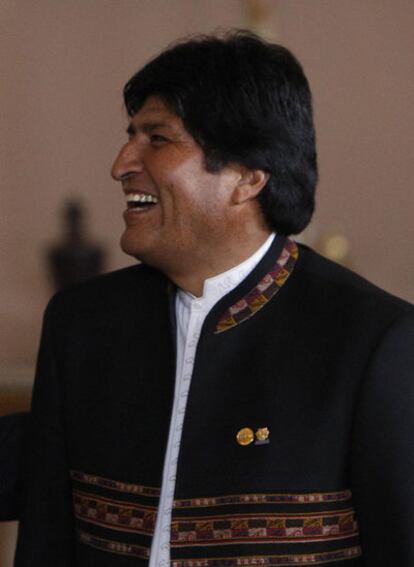Bolivia passes new law to control media
Measure would also allow wiretaps when national security is at risk
The Bolivian Congress — which is controlled by President Evo Morales' party, the Movement Toward Socialism (MAS) — on Thursday passed a new telecommunications law that immediately ignited controversy throughout the Andean nation.
Members of the opposition and the press consider that the legislation gives the government control over the majority of the electromagnetic spectrum, legalizes wiretaps and threatens private media outlets. According to René Martínez, president of the Senate and member of MAS, the law has now been given to Morales so he can sign it.
The law allocates 33 percent of broadcasting licenses to the state, the same amount to the private sector and the remaining third to indigenous and social organizations. The main problem refers to this last percentage, because those groups are normally linked to the president and do not have major sources of income. Critics consider that these groups might turn to the government for funding, which, in practice, gives Morales and his team control over the majority of frequencies and would subsequently put pressure on private media groups.
Before the new law, more than 90 percent of the spectrum was controlled by private companies, and the Association of Bolivian Radio Stations (Asbora) expects that around 400 of the 680 registered radio stations might have to close in 2017, when their licenses come up for renewal, to adjust to the new percentages.
Associations of journalists and broadcasters have openly criticized the decision because, in their opinion, it threatens constitutional rights, opens the door to the firm control of independent media outlets, and could lead to the manipulation of information. The law also obliges television channels and radio stations to broadcast Morales' speeches without charging the government.
Raúl Novillo, president of Asbora, told local newspaper La Razón that the measures were "a serious threat to the freedom of expression." On the contrary, Senator David Sánchez, who endorsed the project, told the BBC that the purpose of the law was to "distribute frequencies more fairly." He argued that the government's ownership of a third of the spectrum did not automatically mean that all stations using those frequencies would reflect the government's positions.
In addition to the controversy surrounding the distribution of licenses, the law includes a clause that allows wiretaps in case of a threat to national security, and compels telecommunication operators to cooperate with officials in order to provide any requested material.
According to the law's critics, this practically legalizes eavesdropping on communications, because it allows the government to spy on politicians and journalists by resorting to the argument of national security. Martínez denied that the move violates any constitutional rights, adding that "the telephone tapping cases will be regulated in detail to avoid infringing on people's privacy and guarantee individual rights." He also mentioned that a telecommunications authority would be created to issue the operating licenses.

Tu suscripción se está usando en otro dispositivo
¿Quieres añadir otro usuario a tu suscripción?
Si continúas leyendo en este dispositivo, no se podrá leer en el otro.
FlechaTu suscripción se está usando en otro dispositivo y solo puedes acceder a EL PAÍS desde un dispositivo a la vez.
Si quieres compartir tu cuenta, cambia tu suscripción a la modalidad Premium, así podrás añadir otro usuario. Cada uno accederá con su propia cuenta de email, lo que os permitirá personalizar vuestra experiencia en EL PAÍS.
¿Tienes una suscripción de empresa? Accede aquí para contratar más cuentas.
En el caso de no saber quién está usando tu cuenta, te recomendamos cambiar tu contraseña aquí.
Si decides continuar compartiendo tu cuenta, este mensaje se mostrará en tu dispositivo y en el de la otra persona que está usando tu cuenta de forma indefinida, afectando a tu experiencia de lectura. Puedes consultar aquí los términos y condiciones de la suscripción digital.








































